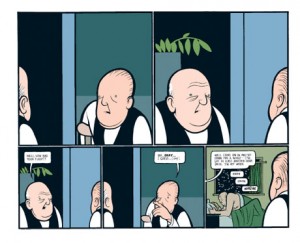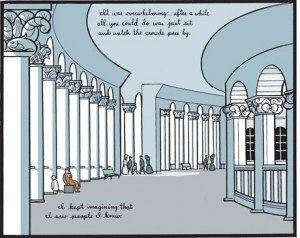

By Ray Pride Pride@moviecitynews.com
Chris Ware At Length In Denmark
 The Comics Journal prints a long interview by Matthias Wivel with Chris Ware: “This interview was conducted in front of a live audience in May 2010 at Komiks.dk, the international Copenhagen comics festival. Ware was an official guest of the festival and his visit coincided with the Danish publication of Jimmy Corrigan: The Smartest Kid on Earth. I concentrated on that book, but also tried to address more general issues in Ware’s work and extended the discussion to his current books.” Quotable: “Fundamentally, it’s an art of composition, the same way that, if you’re a musician or a composer especially, you’re trying to compose something that is coherent and holds together, the same way that our memories are coherent and hold together, but our experiences are not. We take in our experiences and then put them together in a way that makes sense to our personalities and explains our lives and our friends. But the experience itself can be very incoherent and sort of uncomfortable. I guess that sounds pretentious. I should just be telling dumb jokes.”
The Comics Journal prints a long interview by Matthias Wivel with Chris Ware: “This interview was conducted in front of a live audience in May 2010 at Komiks.dk, the international Copenhagen comics festival. Ware was an official guest of the festival and his visit coincided with the Danish publication of Jimmy Corrigan: The Smartest Kid on Earth. I concentrated on that book, but also tried to address more general issues in Ware’s work and extended the discussion to his current books.” Quotable: “Fundamentally, it’s an art of composition, the same way that, if you’re a musician or a composer especially, you’re trying to compose something that is coherent and holds together, the same way that our memories are coherent and hold together, but our experiences are not. We take in our experiences and then put them together in a way that makes sense to our personalities and explains our lives and our friends. But the experience itself can be very incoherent and sort of uncomfortable. I guess that sounds pretentious. I should just be telling dumb jokes.”  And: “there’s a quote from Goethe that “architecture is frozen music”, and I think it actually applies to comics more than anything, because you’re taking images, making them still, and they don’t actually come alive until you read through them; it’s sort of like reading sheet music in a way. You asked me earlier about the drawing style, and I don’t want the emotion of the story to be in the expressiveness of the drawing; the emotion should be in the story itself; it should be in either how you feel the story as you’re reading it or how you remember it. It’s just an artistic choice I made.
And: “there’s a quote from Goethe that “architecture is frozen music”, and I think it actually applies to comics more than anything, because you’re taking images, making them still, and they don’t actually come alive until you read through them; it’s sort of like reading sheet music in a way. You asked me earlier about the drawing style, and I don’t want the emotion of the story to be in the expressiveness of the drawing; the emotion should be in the story itself; it should be in either how you feel the story as you’re reading it or how you remember it. It’s just an artistic choice I made.
Downloadable: A PDF of Dae Raeburn’s invaluable “Imp” issue devoted to Ware.















